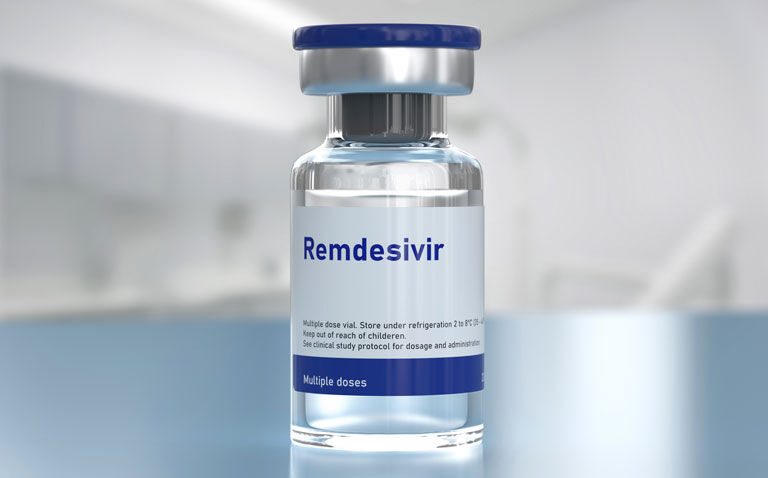A study found that remdesivir use among COVID-19 patients in need of ventilator support offers no advantage over standard care.
Remdesivir use among patients hospitalised with COVID-19 requiring ventilator or oxygen support did not improve clinical outcomes after 15 days compared with standard care. This was the conclusion of a European, multi-centre, open label, randomised, controlled trial.
Remdesivir is a pro-drug that is converted into a nucleoside analog and incorporated by the RNA-dependent RNA polymerase of COVID-19 into the growing RNA product before RNA synthesis stalls.
The drug was approved by the EMA in June 2020 for the treatment of COVID-19 in adults and adolescents from 12 years of age with pneumonia who require supplemental oxygen.
Moreover, early data on remdesivir was encouraging and in a study of over 1000 patients, those randomised to remdesivir use had a median recovery time of 10 days compared with 15 days in those who received placebo.
In contrast, however, the World Health Organization (WHO) Solidarity Trial, concluded that remdesivir, along with hydroxychloroquine, lopinavir and interferon regimens, had little or no effect on hospitalised patients with COVID-19, as indicated by overall mortality, initiation of ventilation and duration of hospital stay.
With such conflicting results, the European team undertook the DisCoVeRy trial and which was designed to evaluate the safety and efficacy of possible therapeutic agents in hospitalised adult patients diagnosed with COVID-19.
Recruited patients were adults hospitalised with COVID-19 who presented with either evidence of rales/crackles on examination and a SpO2 < 94% on room air or had a requirement for supplemental oxygen, high flow oxygen devices, non-invasive ventilation and/or mechanical ventilation. Patients were randomised 1:1 to either remdesivir use (200 mg on Day 1 followed by a 100 mg 1-hour infusion once daily for 10 days) or standard care, which included the use of corticosteroids and anticoagulants.
The primary outcome was the patient’s clinical status at Day 15 as recorded on the 7-point ordinal WHO scale. The scale, which represents increasingly severe disease, ranges from 1 represented those not hospitalised and with no limitation on activities, through 5 (hospitalised on non-invasive ventilation or high flow oxygen) and 6 (hospitalised on invasive mechanical ventilation or extracorporeal membrane oxygenation) and 7 (dead).
Several secondary outcomes were also used including in-hospital mortality and 28-day mortality.
Remdesivir use and clinical outcomes
A total of 857 participants with a median age of 64 years (69.5% male) were randomised to remdesivir (420) or standard care and, at randomisation, 39.4% of individuals had severe COVID-19.
Overall, 73.6% of participants had at least one co-morbidity with the most frequent being obesity (34.1%), cardiac disease (28%) and diabetes (27%).
At Day 15, a similar proportion of those assigned to remdesivir and standard care were categorised as 1 on the WHO scale (14.8% vs 17%, remdesivir vs standard care) and a similar proportion had died (5% vs 6%).
Overall, there was no significant difference between those assigned to remdesivir use or standard care (odds ratio, OR = 1.02, 95% CI 0.62 – 1.70, p = 0.93). Additionally, there were no significant differences in the distribution of the 7-point scale at Day 29 (OR = 1.11, 95% CI 0.87 – 1.43, p = 0.40).
Furthermore, there were no significant differences for each of the secondary outcomes or subgroup analyses according to age, sex, duration of symptoms prior to randomisation or in the level of detectable viral loads at each sampling time.
The authors therefore concluded that the remdesivir use had no impact on clinical outcomes compared with standard care at either Day 15 or Day 29.
Citation
Ader F et al. Remdesivir for the treatment of hospitalised patients with COVID-19: final results from the DisCoVeRy randomised, controlled, open-label trial MedRxiv 2022.










